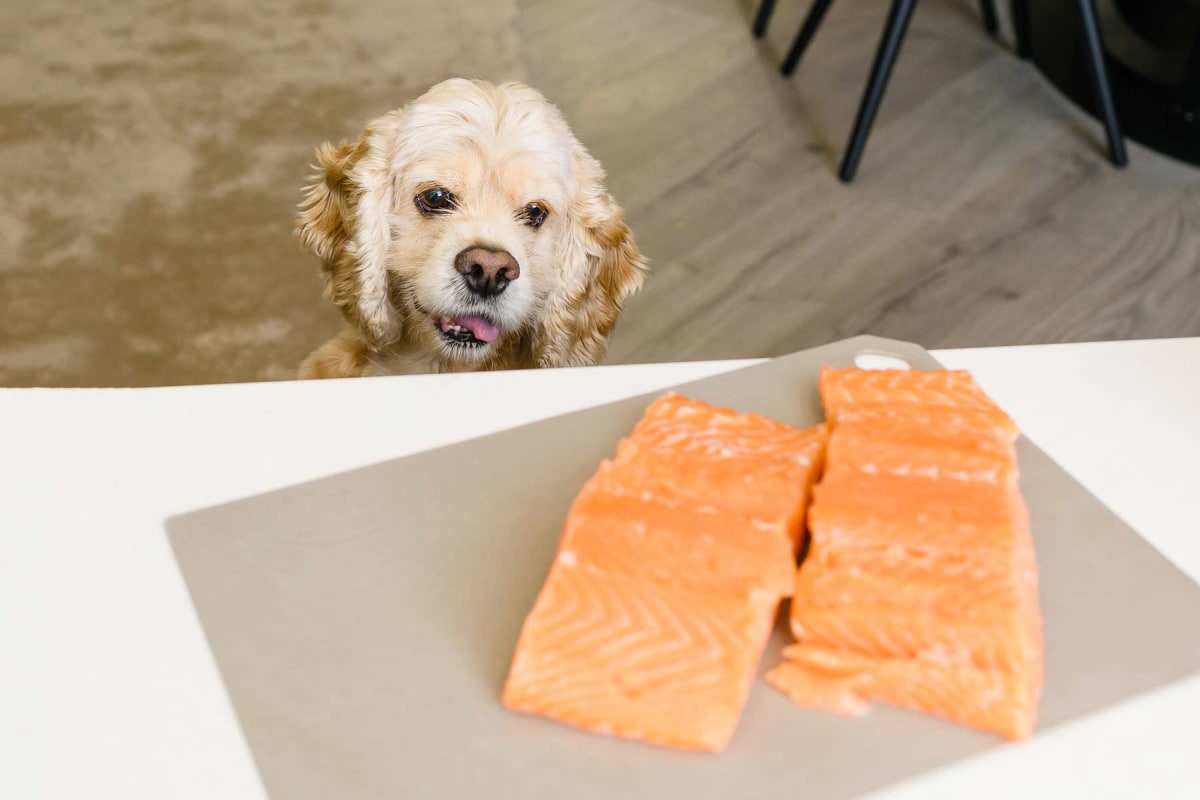
Can dogs eat salmon?
Can dogs eat salmon?
Can dogs have salmon?
If you've ever enjoyed a delicious salmon dinner and noticed your furry friend eyeing your plate with longing, you may have wondered: can dogs eat salmon? The good news is: Yes! Dogs can eat salmon when it's properly cooked. Salmon is a fantastic protein source for dogs when prepared safely and served in appropriate portions.
Let's dive into everything you need to know about feeding salmon to your canine companion, from health benefits to potential risks and proper preparation methods.
Is salmon good for dogs?
Absolutely! Many premium dog foods already include salmon as an ingredient because of its nutritional benefits.
Salmon is rich in high-quality protein that helps maintain your dog's muscle mass and supports overall growth.
One of the most significant benefits comes from omega-3 fatty acids, which promote:
Healthier skin and a shinier coat
Reduced inflammation throughout the body
Improved immune system function
Better brain development (especially important for puppies)
Joint health support (particularly beneficial for older dogs)
Salmon contains vitamins B12 and B6, niacin, and selenium—all important nutrients that contribute to your dog's overall wellbeing.
Can dogs eat salmon skin?
While technically dogs can eat cooked salmon skin in small amounts, it's best to remove the skin before feeding salmon to your dog.
Salmon skin contains the highest concentration of oils and fat in the fish. While these oils include beneficial omega-3s, the high fat content can cause digestive upset or even pancreatitis in some dogs, especially those prone to this condition.
If you do choose to feed small amounts of salmon skin, ensure it is thoroughly cooked, contains no seasonings, and is cut into small, manageable pieces.
Can dogs eat canned salmon?
Yes, dogs can eat canned salmon, but with some important caveats. Follow these guidelines when choosing canned salmon for your dog:
Choose only varieties packed in water rather than oil or brine.
Always check the label to ensure there are no added salt, spices, or preservatives that could be harmful to your dog.
Rinse the canned salmon thoroughly before serving to remove excess sodium.
Canned salmon with bones can actually be beneficial, as the bones are softened during processing and provide additional calcium. Just make sure to mash them thoroughly to prevent any choking hazard.
Can dogs eat raw salmon?
No, dogs should never eat raw salmon. Raw salmon can contain a parasite called Neorickettsia helminthoeca, which causes "salmon poisoning disease" in dogs. This condition can be fatal if left untreated. Symptoms include vomiting, diarrhea, fever, weakness, decreased appetite, swollen lymph nodes, and tremors or seizures.
Always thoroughly cook salmon before feeding it to your dog. The cooking process kills any harmful parasites or bacteria that could make your dog sick.
Can dogs eat smoked salmon?
It's best to avoid giving your dog smoked salmon. Most commercially available smoked salmon contains high levels of sodium and may also contain garlic, onions, or other seasonings that are toxic to dogs.
The smoking process doesn't reach high enough temperatures to kill all potential parasites either. This means smoked salmon still carries many of the same risks as raw salmon.
If you're looking for a salmon treat for your dog, stick with plain, thoroughly cooked salmon instead.
How to safely prepare salmon for your dog
When preparing salmon for your dog, follow these simple guidelines to ensure it's safe and healthy:
Choose fresh, high-quality salmon: Avoid fish with any sauces, spices, or additives.
Remove all bones: Even small bones can pose a choking hazard or cause digestive issues.
Cook thoroughly: Cook the salmon to an internal temperature of at least 145°F (63°C) to kill any parasites or bacteria. Do not use oil, butter, salt, or seasonings.
Serve plain: Do not add any sauces, garlic, onions, or flavorings.
Cool before serving: Let the salmon cool to room temperature before offering it to your dog.
Plain baking, poaching, or steaming are the best cooking methods for preparing salmon for your dog. These methods don't require additional fats and help preserve the nutritional content of the fish.
How much salmon can I give my dog?
Salmon should be considered an occasional treat rather than a dietary staple. A good rule of thumb is that treats (including salmon) should make up no more than 10% of your dog's daily caloric intake.
For small dogs, a bite-sized piece or two of cooked salmon is plenty. Medium to large dogs can have a small palm-sized portion, depending on their size and activity level. If you're unsure about the right portion size for your dog, consult with your veterinarian for personalized advice.
Start with very small amounts when first introducing salmon to monitor how your dog reacts. Some dogs may have allergies or sensitivities to fish.

Other safe foods
While salmon can be a healthy addition to your dog's diet, there are many other nutritious human foods that are safe for dogs, including:
Cooked lean meats like chicken and turkey (without skin, bones, or seasonings)
Many fruits including apples (no seeds), blueberries, and watermelons (no seeds)
Vegetables such as carrots, green beans, and sweet potatoes
Plain, cooked eggs
Small amounts of plain, unsalted peanut butter (check that it doesn't contain xylitol)
Always introduce new foods gradually and in small amounts to monitor how your dog responds.
Remember that every dog is unique, and what works well for one may not be suitable for another. When in doubt about feeding any human food to your furry friend, including salmon, it's always best to consult with your veterinarian first.